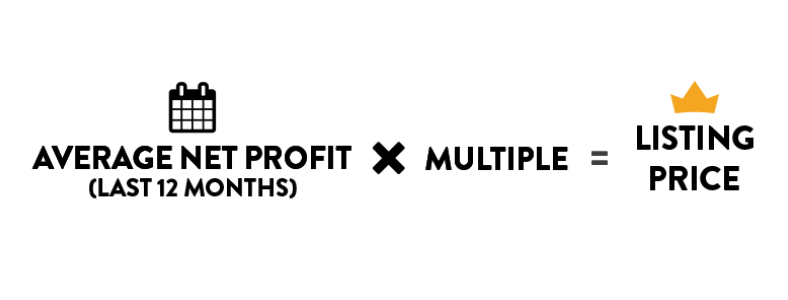How to Sell A Shopify App For 6 Figures and Beyond (Easily)
Most app developers don’t realize they’re sitting on a goldmine. App businesses are some of the most valuable online businesses you can find; they offer an investor a source of mostly passive, recurring revenue.
Even an app that isn’t generating revenue can be valuable, but if your app is earning $2,700+ you could potentially sell it for over $100,000 based on the average valuations of apps on our marketplace.
In this article, we’re going to share why investors acquire Shopify apps and what they look for, how apps are valued, and how to sell your app for six figures and beyond.
Why A Founder Would Sell Their App
The first reason you might want to sell your Shopify app is to receive a large cash lump sum for all of the work you’ve put into building your app.
You can reinvest this capital into other assets like real estate or NFTs to diversify your investment portfolio. Or you can reinvest in another app you’re running. You can dedicate the extra time you get back when you sell your Shopify app business to your other app. This is especially useful if you have other apps or businesses that are taking off or have a lot of growth potential.
A lot of founders are serial app and software builders and like to sell so they can code new apps from scratch. These types of developers tend to get bored of their current app and are hungry for a new challenge.
Another reason to sell is if you’ve reached your limit on how much you can scale your Shopify app business. You’d have to get funding or invest a ton of your time or both to take it to the next level and you just don’t want to do that.
Regardless of your reason for selling, there will always be buyers out there for your app.
Why Buyers Acquire Apps Built on Shopify
Commerce is an industry that’s fundamental to society, there will always be high demand for products, thus platforms like Shopify that have established themselves within the industry are likely to continue to grow. Investors love to get involved in these industries because they offer opportunities for long-term wealth growth.
Shopify is a particularly attractive app platform for investors as it’s the second-biggest ecommerce platform in the US behind Amazon. It’s pretty safe to say we’re not going to see a shortage of Shopify merchants anytime soon. This means the demand for Shopify apps is going to last a long time.
With such a large customer base there are many opportunities for an investor to scale your Shopify app. Plus, Shopify users trust the platform; an app owner has the advantage of leveraging that trust element to generate downloads and sales.
Apps in general are attractive assets as they’re usually mostly-passive revenue generators. Buyers love this type of asset as it allows them to focus on scaling the app instead of spending all of their time running it, or having to hire employees and VAs. It also allows them to keep running their other businesses if they have a portfolio.
What Buyers of Shopify App Businesses Look For
Each Shopify app buyer has their own acquisition criteria, but almost all of them look for the same basic characteristics when assessing an app as a business.
The first thing they’ll look at is the core qualities of your app.
Strong Fundamentals
A well-aged app that is two years and above is usually the minimum standard for buyers as that’s generally enough time for the app to become an established business within its niche.
As for the niche, most buyers are looking for evergreen markets like pet care, home, or automotive. This is because they’re looking for an app that’s always going to be in demand. They may also have a preferred niche they’ve operated in or have some expertise in.
Valuable Qualities of Your App As A Business
Outside of the business qualities of your app that buyers look at to see if it fits their acquisition criteria, there are elements that you can prepare to make your business desirable to a matching buyer—the first is your business operations.
Buyers are looking for an app that’s easy to run with organized processes. This is why it’s important to have standard operating procedures (SOPs) for all of your operations necessary to run the app, including customer service, market research, feature development, app maintenance, and marketing.
The buyer needs to see your unique processes laid out so they can understand how the app has been built and how it works.
You should outsource as many operations as possible to make your business hands-off. If your business requires more than 20 hours per week to run, then you’ll struggle to find a buyer.
Hire virtual assistants (VAs) to take over tasks that don’t require your expertise, including:
- Basic customer service
- Market research
- Basic data collection/tracking
- Social media/content posting
You can even outsource complex procedures like development or accounting.
A cheaper alternative to hiring employees is to use software tools that can automate processes.
While outsourcing tasks does come at a cost, it’s beneficial for your business as it frees up your time to focus on business growth. This is why it will also make your business more valuable.
A buyer will also need to see the financial history of your business. This is the number one indicator of your app’s health as an investment asset.
If your app has experienced dips or spikes in earnings, the buyer would want to know why those happened to give them an understanding of how secure the business is. For example, if your app took a hit in earnings because of a bug, then the buyer would ask you what happened and how you fixed it.
By understanding your app’s history, the buyer can get a good idea of what to expect when they take it over and indeed whether they have the necessary expertise to be successful with your app.
The performance trends of your app also come into play. Apps that are growing in revenue or have a steady earnings history are the most desirable. Whereas apps that have an erratic performance history or are declining aren’t because they’re too risky. An app that’s growing slightly is a safe investment in the eyes of a buyer.
The other performance metrics buyers consider are:
- Downloads
- Active users
- Churn
- Ratings
- Abandonment
All of these qualities have an effect on how much a buyer will be willing to pay for your business. They should all be considered in relation to how they help your business perform overall.
Tips For Increasing the Value of Your Shopify App Business
You can increase the sale value of your Shopify app business by optimizing the application in multiple areas.
Shopify merchants tend to use multiple apps to help them run their app store. Instead of competing with all of them, you should explore app integrations. The more options merchants have for installing your app the more chances you have to get downloads. Research your market and see which shoulder apps you could integrate with to evolve your product.
For example, if your app is a cart checkout tool, you could consider integrating with another app that allows customers to add product variants to their orders.
Some developers would prefer to build the product variation integration into their app as another feature. However, this tendency for developers to build lots of features isn’t always good for business; adding too many features complicates an application and distracts away from its core product.
Building a strong core product and expanding your reach across the app store by integrating with the rest of the market is a good way to increase your brand reach without risking spreading your application too thinly across many functions. You’ll also be building your own personal network of Shopify app developers, opening up new business growth opportunities.
Another effective way to increase the value of your Shopify app business is through marketing.
Creating your own site on Google or connecting with other sites to feature your app are highly-effective marketing tactics; they allow you to increase your app’s visibility to potential users.
On your site, you can share articles or even courses educating users about your product; you can provide recommendations for getting started with your app, tips for getting the most out of your app’s features, and useful information about your niche with the goal of helping Shopify merchants improve their stores. Having a site off Shopify gives you another avenue to add Shopify customers to your downloads list.
How Shopify Apps Are Valued
Throughout our 10+ years as a brokerage selling over 1,900 online businesses, we’ve used a core formula to arrive at highly-accurate business valuations for our sellers:

As for your business’ multiple, this is a figure calculated from the analysis of multiple characteristics of your business.
The first set of characteristics we look at represent the fundamental build of your business:
- Business model
- Age
- How it’s monetized
- How much time it takes to maintain your business
- Niche
The next characteristics are a measure of your business’ defensibility:
- Brand uniqueness
- Product replicability
- Number and quality of reviews
- Ranking in the Shopify app store
- Trademarks
We’ll also assess your business’ performance metrics:
- Consistency of profit
- Monthly recurring revenue and annual recurring revenue
- Traffic
- Churn
- Abandonment
- Downloads
- Active users
Finally, we’ll look at the assets that will be included in the sale:
- Source code
- Employee contracts
- Domains
- Email lists
- Social media accounts
- Software accounts
Our experienced vetting advisors assess all of these characteristics and more to determine your business’ valuation multiple.
We’ve sold apps from 23X to as high as 39X their monthly net profits. If your app is earning $3,000 a month in net profit and you sold at 39X, you’d make a cool $117,000.
Naturally, it’s in a buyer’s best interest to acquire your business for the lowest multiple possible. This is why we recommend you seek professional advice from a trusted broker regardless of whether you decide to sell through a broker or privately.
How to Sell Your Shopify App
The two routes to sell your Shopify app are through a broker or privately on your own.
Listing Your Shopify App For Sale Through a Broker
An online business broker acts as an intermediary for the sales and acquisitions of online businesses. They provide services to help facilitate online business deals including business valuations, business sourcing, buyer sourcing, negotiations assistance, and in some cases assistance with due diligence, funds holding, and migrations.
Usually, a broker also has the necessary legal documentation in place to protect both parties.
Most brokers only consist of a few mergers and acquisitions (M&A) specialists who source businesses and buyers and value businesses. Whereas we have a team of over 80 professionals who handle the entire process of online business sales.
When you present your business information to a broker, they’ll provide you with a professional valuation and create your own business listing to present to their buyer pool (our pool currently has over $7,000,000,000 in funds verified by us) and help facilitate the sale of your business.
Because the broker is providing a service to both parties, they’ll charge a fee to either the buyer or the seller.
An honest broker is as impartial as possible and acts solely as an intermediary to facilitate the best deal for both parties, but naturally they have some of their own interest at heart.
A broker that’s paid a seller commission wants to earn the business owner as much as possible on the sale, as the more the business sells for, the more the broker earns.
A broker who works on a buyer commission is paid a fee by the buyer for sourcing business deals. They’re paid based on the size of the businesses they source, however they want their buyer to keep coming to them for the best deals, so it’s in their best interest to help the buyer knock down the sale price.
Some brokers promise you a higher multiple—knowing their buyers would never pay that—and allow them to negotiate you down to a lower price so they can take a commission on the sale, so beware of this.
It’s in our ethos to be an open and honest broker—you can see this in our quarterly reports where we disclose all of our sensitive financial figures—and we’ve even turned sellers away who have a good offer we can’t beat. We act as impartially as possible to keep both our sellers and buyers coming back to us to buy and sell businesses.
Selling Your Shopify App Privately
When you sell your Shopify app without a broker, it’s on you to do all of the work a broker would usually do to facilitate the deal.
You would first need to calculate your business valuation or have this done by a professional business valuer.
Then you’d need to find a buyer for your business if one hasn’t already come to you. Some places you can find business buyers include:
- Online marketplaces
- Social media groups
- In-person events and conferences
Presenting your business to potential buyers leaves you wide open to scams and competitors who want to steal your business information to get a competitive advantage against you, so be careful.
Make sure you have legal securities in place to prevent people from using your business data for nefarious purposes, including a non-disclosure agreement.
If you don’t have the proper legal documentation in place when selling your business, you could lose thousands, if not hundreds of thousands of dollars fixing legal issues. This is why we recommend you pay for the assistance of a professional lawyer or broker.
To start the process of selling your business, you will create a letter of intent with a buyer. This is a piece of documentation that outlines the intent of both parties to agree upon the sale of your business.
After both parties sign this document, the buyer will carry out due diligence on your business. They’ll need access to your business’ sensitive information to confirm the legitimacy of its earnings and analytics.
After they’ve completed their due diligence, which usually takes around 30 days, they’ll send you a final offer for your business.
To ensure you receive the funds, you should use a third-party escrow service. They can hold the funds on your behalf while you transfer your business assets to the new owner. Having an escrow company hold the funds helps prevent the buyer from running away without paying.
As you can imagine, there is a lot of work and risk involved in selling your business privately. It takes years of expertise and the help of multiple third parties to really know you’re selling your business safely and for the right price. That’s why we recommend business owners to sell through a broker not only to streamline the process and take the stress off of the seller’s shoulders, but to also help them get the most amount of money possible for their business.
Get Free, No-Obligation Advice on Selling Your Shopify App
We like to help business owners safely sell their businesses regardless of whether they sell through us or not. That’s why we offer a free, no-obligation selling advice service.
We help you create an action plan for preparing your business for sale; we’ll check in on your progress every few months to help you get prepared to sell, all for free with no obligation to sell your business with us.
If you’d like to take advantage of this free exit planning service, then schedule a call with one of our friendly, expert online business advisors today.




